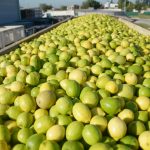Opinion: Strategies to differentiate the Argentine blueberry industry

By Argentinean Blueberry Committee (ABC) president Carlos Stabile
 The 2014 campaign concluded with total exports of 16,500 metric tons (MT) - registering a growth of nearly 30% compared to the previous season - and with a rightful enthusiasm thanks to the great quality fruit we were able to offer the world.
The 2014 campaign concluded with total exports of 16,500 metric tons (MT) - registering a growth of nearly 30% compared to the previous season - and with a rightful enthusiasm thanks to the great quality fruit we were able to offer the world.
The new varieties planted in Argentina performed fantastically in 2014, helping to position our country as a leader in the Southern Hemisphere export window. From August to October, Argentina exported 10,655MT of fruit, which represents 90% of collective South American shipments over that period.
The industry was able to achieve this as a result of vision, confidence, and a strong committment from the producers who were attentive to the nurseries' technological advances and plant improvements and invested in varietal replacement. Back in 2008, Argentine producers were asking themselves what they could do to differentiate their supply from the enormous 'blue tide' coming from Chile. Chilean growers at that time were already supplying more than 40,000MT, and the rate of new plantings meant bigger volumes were sure to follow.
The answer was clear, we had to move the mark, and bring our peak volumes forward so they were well separated from the Chilean season. Us, in mid to late October, and them, two months later - at the end of December and into January. The strategy took time as varietal replacement does not happen overnight. The O'Neil range was gradually displaced to give way for earlier and more productive varieties like Snowchaser, Sapphire, Emerald, and Spring High.
By doing this our supply became more separated from Chile, which was mutually beneficial for both countries.
Another positive was that we also continued the decentralization of the Ezeiza international airport near Buenos Aires by having more cargo flights depart from Tucumán. Clearly this initiative not only contributed to the improvement and increased efficiency of the logistical chain, but it was also beneficial for the fruit's quality. Ezeiza would simply not have been able to handle the volumes we ended up exporting while keeping them all in good condition.
Finally, I should also mention the producers who have entered into the production of fruit under organic conditions. These producers added blueberries to the long list of organic-certified products Argentina is able to offer the world. The increased production has facilitated operations, and that has contributed to the supply of raw materials, substrates, fertilizers certified as suitable for organic production, and the proliferation of certification bodies trained in the correct management of the organic platform.
I know that there are some more reasons to celebrate this last campaign, and each one of the producers has their own - shared to varying degrees by the industry. I also know that we are moving forward on the right path - that of trust, innovation, and team work, which, together with the effort of every producer, contribute to seasons like the one we had in 2014.














































